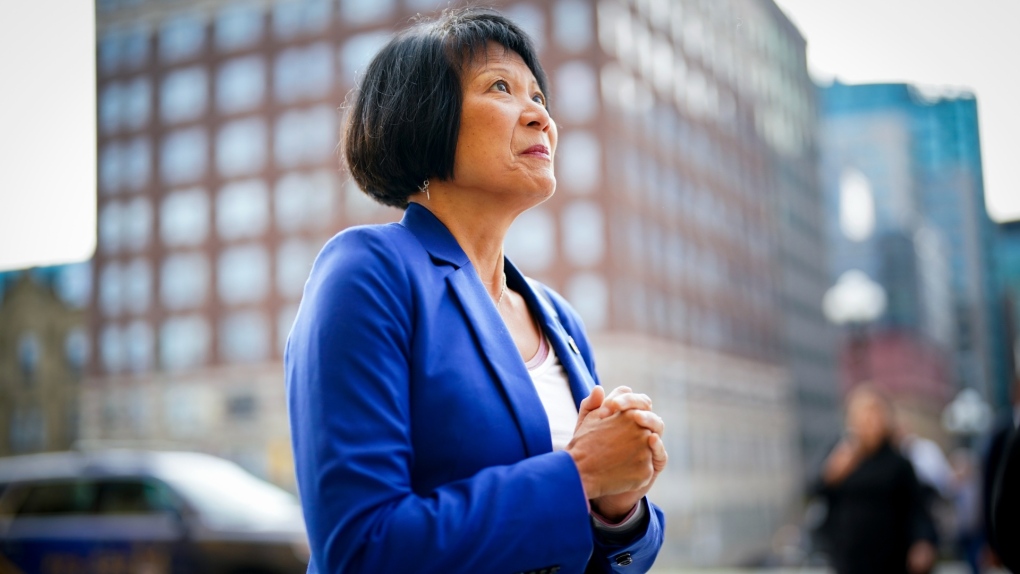‘Just beginning:’ Olivia Chow marks one year as Toronto’s mayor

As Olivia Chow strolls out the wooden doors of Toronto City Hall and into the sunshine of the square, both her star and staying power remain clear.
“I’ve been your biggest fan,” a young woman tells her in earnest. “We’re so happy that you are our Mayor.”
The woman invites her to the Taste of Vietnam festival later this summer, saying the organizers have a custom costume for the mayor in the works.
You can bet Chow will be there. One year into taking office as Toronto’s 66th mayor, her daily itineraries tell the tale of stopping by nearly every festival in the city.
She was at the Taste of Lawrence three times in one weekend, Chow laughs — chatting with Torontonians about transit, taxes, and more.
It is these conversations that Chow so often references from her protocol lounge podium, offhandedly weaving the personal anecdotes of voters she meets along the way into the prepared policy remarks.
“The success is really hearing from the people,” Chow told CTV Toronto in an interview this week. “That they feel that we are making a little bit of a difference, making their life a little bit easier.”
It was one year ago that she rode to City Hall on her peony-clad bike, surrounded by supporters celebrating the return of a progressive to power.
Now, on the 27th-floor observation deck of the building this week, she remarks on the water dripping down from the roof.
“We don’t spend enough dollars on maintaining things, right?”
The lack of upkeep of aging infrastructure was on Chow’s doorstep just last week, when she walked out of her office to find water seeping into the second-floor councillor corridor from the ceiling. Chow pulled out her phone to take a video of it and document the problem.
“I couldn’t believe my eyes,” she said.
The local leak is emblematic of a bigger problem throughout the city — infrastructure whose capital budget has not kept up with state-of-good-repair needs, in some cases literally crumbling as a result of years of underinvestment.
Chow has been saddled with addressing the issue at a time when maintenance money is not easy to find.
A significant victory came for the mayor last fall when she brokered a so-called “New Deal” with the province, demonstrating her ability to negotiate across party lines.
The agreement with Premier Doug Ford to upload the Gardiner and the Don Valley Parkway to the province frees up billions for investment in the TTC, roads, parks and more — but with the operating side still lacking, Chow also spearheaded a near-double-digit property tax hike amid a growing cost-of-living crisis.
“There were a few that said ‘ooh, that’s hard,'” she said, when asked about whether she’d heard from residents upset by the increase.
“I inherited the $1.8-billion budget deficit, we have to pay our way. If not, we just get deeper and deeper into the budget hole.”
The significant property tax hike came with a concession by Chow to approve the full budget increase requested by the Toronto Police, which she had previously rejected.
Chow was also forced to backtrack on implementing ridesharing licence restrictions in the face of a lawsuit by Uber.
The paralyzing impact of Gardiner construction on Toronto traffic also proved a sore spot for Chow, who critics say was slow to respond to the unprecedented effect on commute times and commercial productivity.
“The rebuild is taking time,” Chow acknowledged this week, saying work is underway alongside the province to expedite the schedule, though not yet revealing the details.
But Chow cites her toughest file this year as one that was largely beyond her control as mayor.
“The most challenging is the war in the Middle East,” she reflected. “Because I’m just a local mayor. I have no impact whatsoever.”
Regardless, Chow was forced to navigate the impacts of international conflict on Torontonians as protests escalated and local hate crimes spiked.
“It’s hard because the anguish and the fear felt by so many spill over,” she said.
Hyper-domestic issues, though, have helped keep the progressive popular. Chow has secured smaller wins through expanded library hours, a TTC fare freeze, and a smooth CafeTO patio rollout.
Transit remains a significant priority for Chow, as she continues to pledge progress on the Waterfront LRT and lobby the federal government for new Line 2 subway cars.
Following months of backroom battle with Ottawa, she successfully secured the millions she’d sought for refugee-related shelter costs.
Chow has also led the charge on expanding affordable housing targets, though critics say the applause will come if they can actually be achieved.
“We’re just beginning to get the city back on the right track, but let’s just keep building on it,” she said.
That action plan comes against the clock of a shortened term. One year after her byelection win, Chow has just two years left to achieve the more caring, affordable city she campaigned on.
“It’s a journey,” she said. “It’s just beginning.”
View original article here Source









